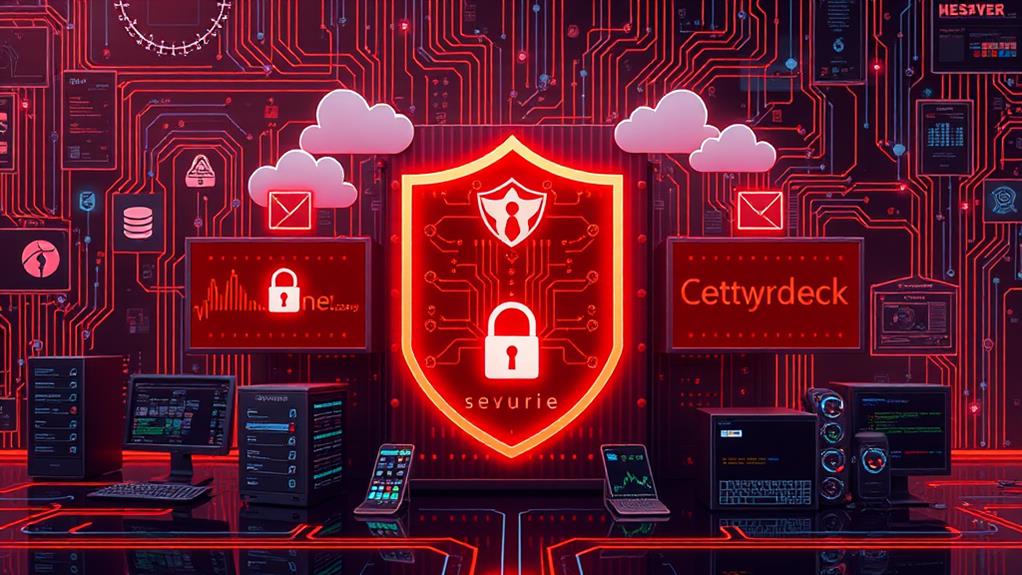As we investigate the domain of online privacy and uncensored web access, the role of Tor emerges as a beacon of digital freedom. With its innovative technology and commitment to safeguarding user rights, Tor stands as a champion in the fight for privacy and unrestricted online investigation. The impact of Tor's decentralized network and encryption tools is significant, but there's more to reveal about its influence on shaping a secure and open internet environment. Let's examine further into the intricacies of Tor's mission and how it continues to shape the conversation around digital rights and privacy in today's interconnected world.
Key Takeaways
- Tor upholds internet privacy and uncensored web access.
- Advocates for digital rights in oppressive regions.
- Enables secure browsing through encryption and anonymity.
- Empowers users with tools to resist surveillance.
- Fosters a decentralized network for privacy protection.
Tor's Impact on Internet Privacy
Tor's impact on internet privacy is notable and far-reaching. By enabling users with tools like onion routing and encryption, Tor improves online privacy and facilitates censorship resistance.
Through a decentralized network of volunteer-run relays and bridges, Tor provides a secure browsing experience that shields users from tracking and surveillance. This user enablement is vital in combating censorship and ensuring unrestricted access to information.
As 81% of users prioritize online privacy, Tor's emphasis on digital rights echoes globally. By promoting decentralized solutions and nurturing community support, Tor continues to champion internet freedom in censored regions and beyond.
The organization's dedication to privacy technologies highlights the ongoing battle against threats to digital rights.
Anonymity and Encryption Technologies
Utilizing onion routing and encryption technologies, the Tor network guarantees user anonymity and data security online.
Onion routing involves encrypting data through multiple network nodes, making it challenging for adversaries to trace the original source or destination of information. This multi-layered approach assures that user activities are obfuscated, safeguarding against surveillance and tracking.
Additionally, Tor incorporates anti-fingerprinting measures to further improve user privacy. By minimizing unique identifiers and patterns that can be used to track individuals, anti-fingerprinting technology bolsters the overall anonymity provided by the network.
These combined efforts create a robust defense mechanism against intrusive monitoring, enabling users to browse the web freely and securely without compromising their privacy.
Empowering Users in Censored Regions
Moving from the technical intricacies of onion routing and encryption technologies, we now shift our focus to the critical aspect of enabling users in censored regions. User empowerment plays a crucial role in promoting digital resistance against oppressive regimes. By providing individuals with tools to reclaim their privacy and access uncensored information, Tor cultivates a sense of agency among users facing online restrictions. The table below highlights key strategies employed by Tor to facilitate individuals in censored regions:
| Strategies for User Empowerment in Censored Regions | |
|---|---|
| Snowflake Proxies | Facilitating access to Tor network in oppressive countries |
| Community Education | Raising awareness about digital privacy and rights globally |
| Strategic Partnerships | Collaborating to improve privacy tools for vulnerable users |
| Tailored Services | Providing specialized support for different user groups |
| Global Outreach | Mobilizing support and advocating for internet freedom |
Mobile Accessibility and Privacy Challenges
Enhancing mobile accessibility poses a major challenge in the domain of digital privacy, especially when considering the prevalence of surveillance and data tracking across various countries.
Mobile browsing has become the primary means of accessing the internet globally, requiring robust privacy tools to combat infringements on digital rights.
The Tor network's focus on mobile compatibility, especially on Android devices, allows users to browse freely and access uncensored content.
In countries like Russia, Iran, and Turkmenistan, where internet censorship is stringent, Tor provides essential tools for anonymity and privacy.
With over 122,000 censored domains in Turkmenistan alone, the need for privacy tools to resist surveillance and censorship is critical, ensuring users can navigate the web without compromising their digital rights.
Community Support and Partnerships
Within the domain of digital privacy advocacy, our focus extends beyond technical innovations to include the fundamental pillar of community support and strategic partnerships.
Community engagement plays a crucial role in sustaining Tor's network of volunteer-run relays and bridges, nurturing a collaborative environment for privacy advocates.
Strategic alliances with organizations sharing our mission boost the impact of our efforts, enabling broader outreach and support for individuals in censored regions.
Through these partnerships, we utilize diverse resources and knowledge to improve user privacy and combat censorship worldwide.
Importance of Decentralization in Tor
Expanding on our commitment to digital privacy, the Tor Project highlights the significance of decentralization within its network architecture. Decentralized networks play a crucial role in enabling users and fortifying the Tor ecosystem against threats. Here is a table illustrating the importance of decentralization:
| Aspects of Decentralization | Benefits |
|---|---|
| Redundancy in Nodes | Prevents single points of failure, increases network resilience |
| User Participation | Strengthens censorship resistance, enhances network robustness |
| Privacy Protection | Safeguards vulnerable users, assists connectivity in repressive environments |
| Open-Source Solutions | Defends user rights, supports decentralized tools against censorship |
Decentralization not only guarantees network stability but also nurtures a community-driven approach, reinforcing the core principles of digital privacy and user empowerment.
Advocacy for Digital Rights and Freedom
To effectively advocate for digital rights and freedom, we must understand the fundamental principles underpinning the Tor Project's mission and the critical role it plays in safeguarding online privacy.
Digital activism thrives on promoting user privacy through tools like Tor, emphasizing the need for robust privacy legislation to protect individuals online.
By engaging in advocacy efforts, we enhance the voices of those fighting for internet freedom and against censorship.
Pushing for thorough privacy legislation guarantees that digital rights are enshrined in legal frameworks, safeguarding users against invasive surveillance practices.
Through active involvement in promoting digital rights and freedom, we contribute to a global movement aiming for a more secure and open online environment where privacy is respected and protected.
Frequently Asked Questions
How Does Tor Address Vulnerabilities in Its Encryption Technology?
We guarantee Tor's encryption protocols remain robust by constantly updating and auditing the code. Our team integrates advanced privacy improvements to fortify user security, mitigating vulnerabilities and safeguarding against potential breaches.
What Specific Tools Does Tor Provide for Users in Censored Regions?
We equip users in censored regions with specialized tools like Snowflake proxies, ensuring uncensored access and user anonymity. Our efforts in Iran saw proxies surge from 30,000 to 130,000, enabling essential connections.
How Does Tor Ensure Compatibility With a Wide Range of Mobile Devices?
We guarantee mobile usability and device compatibility through prioritizing optimization for various handheld devices. Tor's design highlights downward compatibility, especially for Android, enabling users worldwide to access uncensored content seamlessly regardless of their location.
What Types of Partnerships Does Tor Engage in to Support Its Mission?
We forge community engagement, funding partnerships, advocacy collaborations, and research initiatives to uphold our mission. By joining forces with diverse entities, we boost impact, enrich resources, and drive innovation in safeguarding online privacy.
How Does Tor Manage and Maintain Its Decentralized Network Infrastructure?
We guarantee network scalability by distributing over 10,000 nodes globally, enhancing user anonymity through onion routing. Decentralization strengthens our resistance against censorship and surveillance. Our focus on redundancy and community support fortifies the Tor network.





